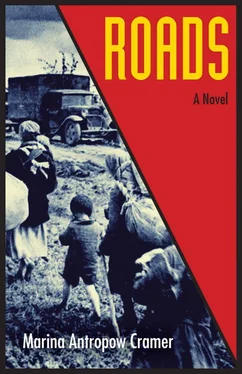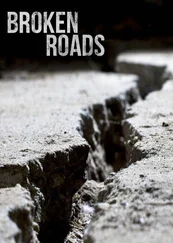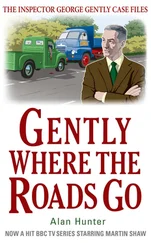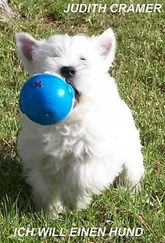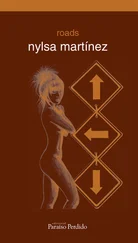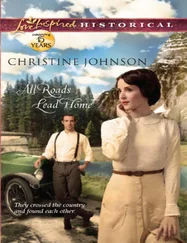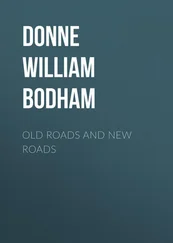Ilya wiped her face with his handkerchief. “Blow your nose,” he said. “You will never go there again. I promise.”
He packed his things, and they walked down to the embankment, where they sat on a bench facing the sea, talking of this and that, until a passing commercial photographer came by and took their picture, which Ilya paid for even though he had sold nothing that day.
The picture showed Ilya seated on the bench in his white summer suit, one long leg crossed casually over the other at the knee, his captain’s cap pushed back to reveal a becoming disarray of dark hair. He is not smiling, but his face looks pleasant, relaxed. Galina sits at his side, hands in her lap, bony shoulders and skinny legs protruding from a simple sundress, her braided hair glowing in the last of the afternoon sun. She, too, does not smile, but looks contented, the traces of tears all but imperceptible on her solemn face.
IF HE TILTED his notebook just a few centimeters to the right, Filip thought Galina might be able to read his answers. She had never asked for his help, not even in history, where he knew she struggled with the dates and battles that seemed so important to Leonid Petrovich. But just in case, if it helped her get a better grade, at least on this written part of the exam, Filip wanted to make it easier for her. He couldn’t do much for her in the orals, but maybe her sweet disposition and pretty face would charm the old curmudgeon of a teacher enough to get her through.
Galina and Filip had been deskmates from the first day of school, apparently purely by chance. For one thing, from the age of seven until now, when they were both twelve, they had been almost exactly the same height. They did not know if this mattered, or if the placement followed some other arcane logic. In any case, fate or administrative will had given them a place halfway down the row of double desks nearest the wall, under the faded map of the world, and so it had stayed through a succession of teachers with only a change in fourth grade to a room with bigger desks.
The world map looked old and dull next to the bright new one of the USSR, which showed the changed city names and boldly outlined the borders with Europe, Asia, and the Arab countries, like a vast net holding in the nations of the Soviet Union against encroachment by unenlightened or aggressive neighbors. Filip had dutifully learned the names—Ossetia, Azerbaijan, Chechnya, Kazakhstan, the dreaded Siberia; he memorized the new cities, too—Leningrad, Murmansk, Gorky, Engels, Svobodny. Often, though, he found his eyes wandering with fascination into the forbidden shadowy West.
It was a world he could only access through classic literature and his growing stamp collection. He sank into all the European novels he could find: Dumas, Stendhal, Goethe, Cervantes. He devoured Shakespeare’s plays and anything else in translation that had evaded the censor’s hand. The stamps he bought from an outdoor stall at the weekly market, with pocket money his indulgent mother slipped him whenever she could. He especially prized the occasional stamp from France, Germany, even America, that his father, who worked for the postal service, was able to bring home from confiscated mail.
“What happens to the letters?” Filip asked once, admiring a new South American stamp: a woven cornucopia, representing fruit farming, with oranges, pears, peaches, cherries, a fine-looking melon, succulent grapes, all etched in muted blue, framed with a russet geometric border. Fruticultura , he read the inscription to himself, savoring the strangeness of the foreign words. Republica Argentina.
“The inspector takes them away,” his father replied, sipping his morning tea. He had the fine-boned fingers, keen intelligence, and taste for sweet treats that Filip had inherited. The dark eyes, olive complexion, and slight build Filip had from Zoya, his Greek mother, along with her capricious temperament.
“What if there’s money inside, or photographs?”
His father turned the page of the book he was reading. Filip knew the conversation was over. No loose talk was the law of survival in their world, especially in government matters. Questions about the reasons for repressive edicts were best kept buried deep in one’s own mind, like the little icon of the Virgin Mary his mother hid in the lining of her handbag, wrapped in a hand-embroidered handkerchief with delicate crocheted edges.
“ Mat’ moya ,” his mother would say whenever some unpleasant situation arose: an uncommonly long line for bread, or the sharklike appearance of a black sedan at the end of their street, gliding silent and ominous, as if the car itself were endowed with superior powers of detection, capable of seeing into the shuttered rooms of your very soul. It was a common enough expression—Mother mine. Filip knew she was not invoking the grandmother who had died before he was born, but calling on the divine protector whose presence no edict could excise from Zoya’s life.
Filip looked on this outmoded obsession with amused indulgence, like a harmless if annoying habit that had nothing to do with his own life. He had long since refused to accompany Zoya to her secret meetings with other Orthodox celebrants, where they lit candles and chanted ancient prayers in whispered tones. It was no more than a witches’ Sabbath to him, a pointless throwback to bygone times that had kept the Russian people humble and penitent for centuries. He thought the promise of eventual reward in some other life a dubious prospect. Where was the evidence? If Jesus had indeed decreed that people must endure the harsh burden of farm or factory labor and embrace their poverty, while elegant, listless intelligentsia played their lives away in Finland, Monaco, Tuscany, and Paris, then he had no use for Jesus.
He was a modern boy. He washed and ironed his red scarf with meticulous care, its vibrant glow reflecting his own pride in being part of the ascendant Soviet future.
“I want to be a Young Pioneer,” he had told his parents shortly after his eighth birthday. “My friend Borya and just about all the other kids belong. They sing songs and march in parades, and wear a red scarf around their necks. I want a red scarf.” He spoke breathlessly, the words rushing from him in a single stream, not to be stopped by the look of horror on his mother’s face.
“ Mat’ moya !” she had exclaimed, hurriedly crossing herself against this specter of evil in her house. “What are you saying?”
“It might be a good idea, Zoya,” his father had cut in. “Just last week a postal clerk at our office was let go for exhibiting ‘monarchist nostalgia.’ It seems he spoke a little too warmly about old times.”
“So you think this might help you keep your job? By sacrificing our son, our only child?” She had laid a protective hand on Filip’s shoulder.
“It is not sacrifice. It may be survival, ours and his.” He had looked at his son with a sympathetic smile. “What do they do, the Pioneers?”
“They meet after school. They sing songs and march in parades,” Filip repeated, not knowing what else to say.
He had been sent to bed without an answer. He lay sleepless on his cot, straining to hear the conversation in the kitchen, trying to decipher, if not the words, then at least the direction of the argument. But his parents were adept at keeping adult matters from his curious ears, a skill honed by cramped postrevolutionary living conditions. He had caught the occasional word— club… no harm… children —in his father’s even tone. His mother’s voice was higher, more agitated, lapsing into a whiny drone that signaled, to Filip, her extreme distress. And then, a breakthrough; a whole sentence rang out, clear and sharp in the evening stillness: “They teach them to be godless informers!” Zoya had exclaimed, each word distinct as hail in a storm. It got quiet then, with only his mother’s soft sobbing, his father repeating “ Dovol’no, dovol’no ,” in an effort to calm her down. Enough.
Читать дальше
